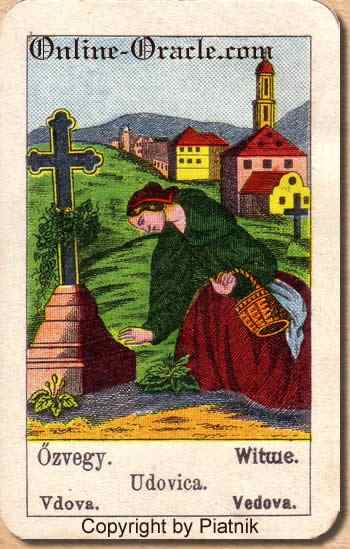The following is something I’ve crossed-posted at several places, some as a comment at Kaph’s wonderful Art of Cartomancy, some at the Lenormand Cards Study Group at facebook, and some at Andybc’s superb online Lenormand course, Cartomante’s Cabinet. (You can find all of these under “Cards” in the sidebar to your right.) I’m still looking for answers but I found some interesting ideas along the way and I’d like to share them here, (and I realized I’d written a whole blog post without trying, haha!) so apologies if you’ve seen any of this already:
I’m truly confused about Widow and Widower (Ziguener Wahrsagekarten) when they don’t represent people, why would there be two cards included in a small deck like this to indicate “Loneliness/you’re on your own/burying the past”?
This deck is hugely popular in Europe so I have to assume that it can work as well as Lenormand, and while Lenormand has several cards that can indicate things like “messages”, they have different inflections and alternate meanings, there aren’t any redundancies. So I feel like I’m missing something important.
I finally ordered the Little Czech Oracle Deck today. (Available at Baba Studios for a very nice price! And it’s got that Piatnik quality.) It’s a 32 card oracle deck that was designed in the 1990′s. I googled scans for the whole deck and I see that it has a lot of the typical images that you find in Lenormand, Sibilla, Sibyl, Kippers, etc. like Child, Fidelity, House, Thief, etc. It even has a Broken Mirror like Gypsy Witch. The designer, Iva Huttnerova, seems to be familiar with these systems and the deck seems well thought-out, but it’s got – you guessed it – Widow and Widower.
So they must be important and carry two separate meanings. All I’ve been able to google are blog posts by people who seem to be in the same position as me. We’ve all been “just guessing”.
I have a theory:
The two cards look very different in the Biedermeier deck. The Widower appears to be older, his hair is grayish and he has a cane. He’s standing, but the Widow is kneeling. She looks young and attractive, she has a little basket and seems to be planting something. (Fertility reference?) This site cautions not to let yourself be manipulated by others:
http://www.online-oracle.com/biedermeier-witwe.php
It makes me suspect that the answer might be something from pre-feminist times: A widow was under the protection of neither parents nor husband, was often plunged into poverty, and was definitely a target for people trying to take advantage. (Things like this still happen, people are just more subtle about it. It’s possible that seeing the card this way isn’t PC, so no one is talking about this implication.) The Widower, OTOH, simply cautions not to become overdependent on help from other people.
http://www.online-oracle.com/biedermeier-witwer.php
In other words, people are bringing the Widower casseroles and setting him up with eligible girls from well-to-do families, they’re supportive and he’s financially solvent, but they’re trying to have one night stands with the Widow, seize her property and they’re generally acting like vultures. She’s probably taking in washing and selling her property off piece by piece. I can see these meanings being “lost” (especially since so many readers are women…it’s not a pleasant thought at all) but I don’t have any real confirmation for them at this time.
Even if I’m wrong about this, it might be interesting to go through these decks and consider them in light of the times…think of the Brontë sisters and Jane Austen rather than anything contemporary when formulating ideas about the cards.
In our own time, we’re not restricted to being housewives, schoolmarms, governesses or prostitutes, but I think the meanings might be still be valid. Sometimes you go through a crisis and everyone gathers around and tries to help. Other times they don’t care, and if they do take notice, it’s only to try to injure you further for their own gain. Think of teenage runaways offered a meal or a place to stay for the night in exchange for sex…as a species, we haven’t really progressed. It’s a mistake to pretend we have.
Since this occurred to me, I think I will always see the Widow as vulnerable, and the Widower as someone being supported through a painful time. I can’t unsee it.
I think the cards have things to say about the human experience and it diminishes them to “update” them. They work perfectly fine with the historical inflections intact.
Thoughts?

The more I think about your theory, the more sense it makes to me. If we assume that the Gipsy/Sibilla cards were developed specifically for divination in the 19th century, and that their symbolism was derived from the cartomancy systems of the time, then it stands to reason that the meanings would reflect the Victorian attitudes of the day. And as you say, things have not changed as much as we would like to believe. I agree it’s important to consider the cards within their historical context. These perceptions have forever changed my ideas about the Widow and Widower as well.
love your site! just got a gorgeous deck of Piatnik jeu de destin Lenormand cards about a month and a half ago & i love them but they’re more difficult for me to learn than i thought it would be…